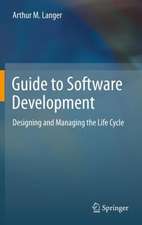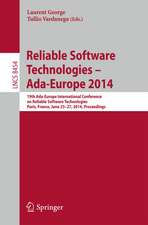Adaptive Signal Processing: Theory and Applications: Monographs in Computer Science
Autor Thomas S. Alexanderen Limba Engleză Paperback – oct 2011
Din seria Monographs in Computer Science
- 20%
 Preț: 1322.33 lei
Preț: 1322.33 lei - 20%
 Preț: 511.92 lei
Preț: 511.92 lei - 20%
 Preț: 1285.31 lei
Preț: 1285.31 lei - 20%
 Preț: 333.22 lei
Preț: 333.22 lei - 20%
 Preț: 328.60 lei
Preț: 328.60 lei - 15%
 Preț: 646.94 lei
Preț: 646.94 lei - 20%
 Preț: 357.48 lei
Preț: 357.48 lei - 20%
 Preț: 339.47 lei
Preț: 339.47 lei - 20%
 Preț: 653.21 lei
Preț: 653.21 lei - 20%
 Preț: 329.44 lei
Preț: 329.44 lei - 20%
 Preț: 993.74 lei
Preț: 993.74 lei - 20%
 Preț: 992.26 lei
Preț: 992.26 lei - 20%
 Preț: 1630.95 lei
Preț: 1630.95 lei - 20%
 Preț: 656.03 lei
Preț: 656.03 lei - 20%
 Preț: 650.08 lei
Preț: 650.08 lei - 20%
 Preț: 328.09 lei
Preț: 328.09 lei - 20%
 Preț: 641.16 lei
Preț: 641.16 lei - 20%
 Preț: 334.38 lei
Preț: 334.38 lei - 18%
 Preț: 737.74 lei
Preț: 737.74 lei - 20%
 Preț: 642.19 lei
Preț: 642.19 lei - 20%
 Preț: 641.99 lei
Preț: 641.99 lei - 20%
 Preț: 345.59 lei
Preț: 345.59 lei - 20%
 Preț: 711.29 lei
Preț: 711.29 lei - 20%
 Preț: 1001.16 lei
Preț: 1001.16 lei - 20%
 Preț: 661.47 lei
Preț: 661.47 lei - 20%
 Preț: 343.62 lei
Preț: 343.62 lei - 20%
 Preț: 644.81 lei
Preț: 644.81 lei - 15%
 Preț: 505.30 lei
Preț: 505.30 lei - 20%
 Preț: 640.69 lei
Preț: 640.69 lei -
 Preț: 396.78 lei
Preț: 396.78 lei - 18%
 Preț: 956.81 lei
Preț: 956.81 lei - 20%
 Preț: 592.68 lei
Preț: 592.68 lei - 20%
 Preț: 329.44 lei
Preț: 329.44 lei -
 Preț: 383.33 lei
Preț: 383.33 lei - 20%
 Preț: 349.40 lei
Preț: 349.40 lei - 20%
 Preț: 832.40 lei
Preț: 832.40 lei - 20%
 Preț: 993.42 lei
Preț: 993.42 lei - 20%
 Preț: 337.85 lei
Preț: 337.85 lei - 20%
 Preț: 988.16 lei
Preț: 988.16 lei - 20%
 Preț: 996.56 lei
Preț: 996.56 lei - 20%
 Preț: 1293.37 lei
Preț: 1293.37 lei - 20%
 Preț: 1452.94 lei
Preț: 1452.94 lei
Preț: 578.87 lei
Preț vechi: 681.02 lei
-15% Nou
Puncte Express: 868
Preț estimativ în valută:
110.78€ • 120.29$ • 93.06£
110.78€ • 120.29$ • 93.06£
Carte tipărită la comandă
Livrare economică 22 aprilie-06 mai
Preluare comenzi: 021 569.72.76
Specificații
ISBN-13: 9781461293828
ISBN-10: 1461293820
Pagini: 192
Ilustrații: X, 180 p.
Dimensiuni: 155 x 235 x 10 mm
Greutate: 0.28 kg
Ediția:Softcover reprint of the original 1st ed. 1986
Editura: Springer
Colecția Springer
Seria Monographs in Computer Science
Locul publicării:New York, NY, United States
ISBN-10: 1461293820
Pagini: 192
Ilustrații: X, 180 p.
Dimensiuni: 155 x 235 x 10 mm
Greutate: 0.28 kg
Ediția:Softcover reprint of the original 1st ed. 1986
Editura: Springer
Colecția Springer
Seria Monographs in Computer Science
Locul publicării:New York, NY, United States
Public țintă
ResearchCuprins
1 Introduction.- 1.1 Signal Processing in Unknown Environments.- 1.2 Two Examples.- 1.3 Outline of the Text.- References.- 2 The Mean Square Error (MSE) Performance Criteria.- 2.1 Introduction.- 2.2 Mean Square Error (MSE) and MSE Surface.- 2.3 Properties of the MSE Surface.- 2.4 The Normal Equations.- 2.5 Further Geometrical Properties of the Error Surfaces.- Problems.- References.- 3 Linear Prediction and the Lattice Structure.- 3.1 Introduction.- 3.2 Durbin’s Algorithm.- 3.3 Lattice Derivation.- Problems.- References.- 4 The Method of Steepest Descent.- 4.1 Introduction.- 4.2 Iterative Solution of the Normal Equations.- 4.3 Weight Vector Solutions.- 4.4 Convergence Properties of Steepest Descent.- 4.5 Mean Square Error Propagation.- Problems.- References.- 5 The Least Mean Squares (LMS) Algorithm.- 5.1 Introduction.- 5.2 Effects of Unknown Signal Statistics.- 5.3 Derivation of the LMS Algorithm.- 5.4 Convergence of the LMS Algorithm.- 5.5 LMS Mean Square Error Propagation.- Problems.- References.- 6 Applications of the LMS Algorithm.- 6.1 Introduction.- 6.2 Echo Cancellation.- 6.3 Adaptive Waveform Coding.- 6.4 Adaptive Spectrum Analysis.- References.- 7 Gradient Adaptive Lattice Methods.- 7.1 Introduction.- 7.2 Lattice Reflection Coefficient Computation.- 7.3 Adaptive Lattice Derivations.- 7.4 Performance Example.- Problems.- References.- 8 Recursive Least Squares Signal Processing.- 8.1 Introduction.- 8.2 The Recursive Least Squares Filter.- 8.3 Computational Complexity.- Problems.- References.- 9 Vector Spaces for RLS Filters.- 9.1 Introduction.- 9.2 Linear Vector Spaces.- 9.3 The Least Squares Filter and Projection Matrices.- 9.4 Least Squares Update Relations.- 9.5 Projection Matrix Time Update.- Problems.- References.- 10 The Least Squares Lattice Algorithm.-10.1 Introduction.- 10.2 Forward and Backward Prediction Filters.- 10.3 The LS Lattice Structure.- 10.4 Lattice Order and Time Updates.- 10.5 Examples of LS Lattice Performance.- Problems.- References.- 11 Fast Transversal Filters.- 11.1 Introduction.- 11.2 Additional Vector Space Relations.- 11.3 The Transversal Filter Operator Update.- 11.4 The FTF Time Updates.- 11.5 Further Computational Reductions.- Problems.- References.
















